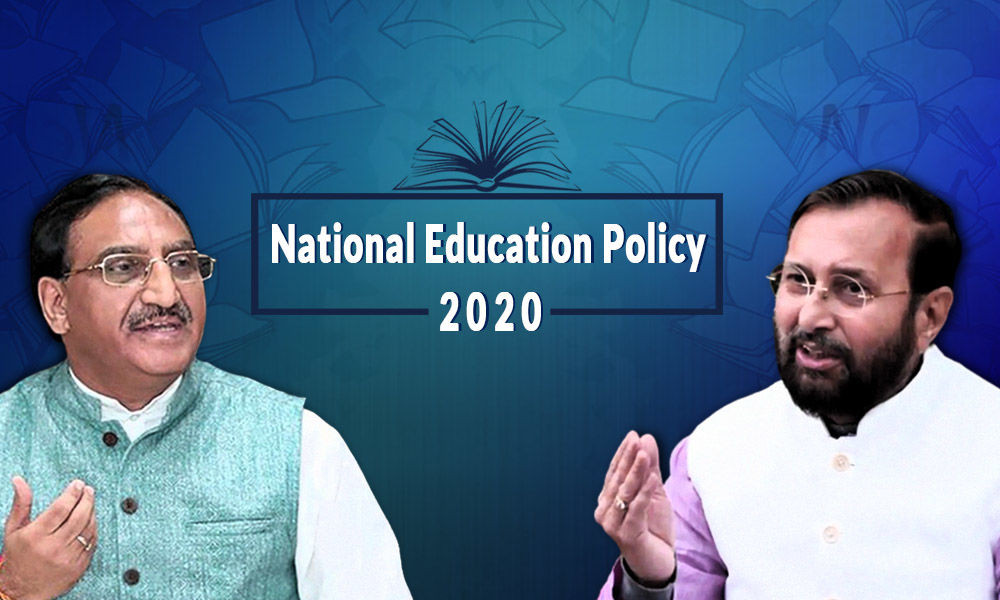In a major reform in education, the Union Cabinet on Wednesday, July 29, approved the new National Education Policy (NEP). The policy also provides for increased focus on non-academic skills and increased inclusion through language diversity and course fluidity.
‘Cabinet under Prime Minister Narendra Modi has given approval to new education policy for the 21st century. It is important, as for 34 years there were no changes in the education policy,’ Union Minister Prakash Javadekar said while making the announcement.
The Cabinet will also rename the Ministry of Human Resource Development as the Ministry of Education. Union Ministers Prakash Javadekar and Ramesh Pokhriyal Nishank said there would be a single regulator for all higher education institutions.
Some of the major reforms include a plan to increase public spending on education to nearly 6 per cent of Gross Domestic Product (GDP) from around 4 per cent, wholesale restructuring of higher education into three categories of institutions, and discontinuation of MPhil courses.
I wholeheartedly welcome the approval of the National Education Policy 2020! This was a long due and much awaited reform in the education sector, which will transform millions of lives in the times to come! #NewEducationPolicyhttps://t.co/N3PXpeuesG
— Narendra Modi (@narendramodi) July 29, 2020
The NEP 2020 has been developed after consultations for nearly five years with stakeholders and the general public and the draft was prepared by a panel headed by former Indian Space Research Organisation (ISRO) chief Dr K Kasturirangan. It was submitted to the Union Human Resource Development Minister Ramesh Pokhriyal when he took charge in 2019. The NEP was drafted in 1986 and was later updated in 1992.
Here are the key takeaways of the National Education Policy 2020:
School Education
Universal Access At All Levels Of School Education
The NEP 2020 aims to ensure universal access to school education at all levels- preschool to secondary.
The provisions to achieve these include infrastructure support, innovative education centres to bring back dropouts into the mainstream, tracking of students and their learning levels, facilitating multiple pathways to learning involving both formal and non-formal education modes and association of counselors or well-trained social workers with schools, secondary education programs equivalent to Grades 10 and 12, vocational courses, adult literacy and life-enrichment programs, among others.
Early Childhood Care and Education
The 10+2 structure of school curricula is to be replaced by a 5+3+3+4 curricular structure corresponding to ages 3-8, 8-11, 11-14, and 14-18 years respectively.
The move will bring the uncovered age group of 3-6 years under school curriculum, which has been recognised globally as the crucial stage for the development of mental faculties of a child. The new system will have 12 years of schooling with three years of Anganwadi/pre-schooling.
The NCERT will also develop a National Curricular and Pedagogical Framework for Early Childhood Care and Education (NCPFECCE) for children up to the age of 8.
Attaining Foundational Literacy and Numeracy
The MHRD will set up a National Mission on Foundational Literacy and Numeracy. For attaining universal foundational literacy and numeracy in all primary schools for all learners by grade 3 by 2025, the states will prepare an implementation plan. A National Book Promotion Policy is also to be formulated.
Reforms In School Curricula And Pedagogy
The school curricula and pedagogy will aim for the holistic development of learners by equipping them with the key 21st-century skills, reduction in curricular content to enhance essential learning and critical thinking and a greater focus on experiential learning.
Students will have increased flexibility and choice of subjects and there will be no rigid separations between arts and sciences, between curricular and extra-curricular activities, between vocational and academic streams.
Mother Tongue To Be A Medium Of Instruction Till 5th Grade
The NEP 2020 has emphasized mother tongue/local language/regional language as the medium of instruction at least till Grade 5, but preferably till Grade 8 and beyond.
Meanwhile, Sanskrit will be offered at all levels of school and higher education as an option for students, including in the three-language formula.
Other classical languages and literature of India will also to be available as options and no language will be imposed on any student. Several foreign languages will also be offered at the secondary level.
Assessment Reforms:
The NEP 2020 hopes to shift from summative assessment to a more competency-based regular assessment which tests analysis, critical thinking and conceptual clarity.
All students will take school examinations in Grades 3, 5, and 8. While Board exams for Grades 10 and 12 will be continued, it will be redesigned with holistic development as the aim.
Equitable And Inclusive Education:
NEP 2020 aims to ensure that no child loses a…











